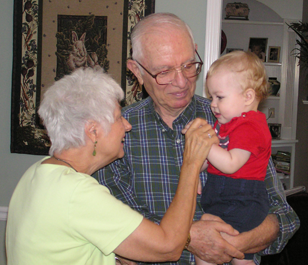Truman Pool
by Nancy Poole
By fifteen minutes, my husband Truman (Sonny) was the older of a set of twins born in Atlanta, Georgia. Sonny spent his childhood in Tifton, Georgia, his teen-age years in Columbus, Georgia, and earned his college degree in business from Auburn University. Sonny spent his working life of more than 32 years at Life of GA Insurance Company (ING). He loved God, family, music, sports and gardening. We have a son, daughter, and four grandchildren ranging from 6 to 20 years in age.
 My family and friends have all been impacted by this long, painful journey of PSP that was initially diagnosed as Parkinson’s in 2007. I believe it actually began 9 years earlier in 1998 when he began experiencing weight loss, developed a slight tremor, and had some short-term memory loss, among other symptoms, all of which were diagnosed as hyperthyroidism. With medication, his thyroid stayed within a normal range, but the fatigue and muscle weakness remained. In 2006, he began having difficulty with balance – he had trouble rising from a chair, walking, and experienced frequent falls. He suffered “episodes” where his blood pressure seemed to drop, which caused extreme sweating and dizziness. These “episodes” remained frequent throughout his illness. Our primary care doctor sent us to a neurologist in 2007 – the diagnosis given was Parkinson’s. From May until December of that year, medication proved ineffective and eventually, we were sent to a neurologist at Emory University. The Emory neurologist administered a memory test which came back inconclusive – possibly Lewy Body was the speculation. Around the time of that first visit to Emory, I read an article in American Parkinson Association newsletter on atypical Parkinsonian disorders, specifically PSP. After reading it, I just knew that was what my husband had – everything seemed to fit. In 2008, we attended our first Parkinson support group in our area. I knew his symptoms were similar to Parkinson’s yet different, affecting balance, movement and speech sooner and more. No medication ever helped, which was also another common issue with PSP.
My family and friends have all been impacted by this long, painful journey of PSP that was initially diagnosed as Parkinson’s in 2007. I believe it actually began 9 years earlier in 1998 when he began experiencing weight loss, developed a slight tremor, and had some short-term memory loss, among other symptoms, all of which were diagnosed as hyperthyroidism. With medication, his thyroid stayed within a normal range, but the fatigue and muscle weakness remained. In 2006, he began having difficulty with balance – he had trouble rising from a chair, walking, and experienced frequent falls. He suffered “episodes” where his blood pressure seemed to drop, which caused extreme sweating and dizziness. These “episodes” remained frequent throughout his illness. Our primary care doctor sent us to a neurologist in 2007 – the diagnosis given was Parkinson’s. From May until December of that year, medication proved ineffective and eventually, we were sent to a neurologist at Emory University. The Emory neurologist administered a memory test which came back inconclusive – possibly Lewy Body was the speculation. Around the time of that first visit to Emory, I read an article in American Parkinson Association newsletter on atypical Parkinsonian disorders, specifically PSP. After reading it, I just knew that was what my husband had – everything seemed to fit. In 2008, we attended our first Parkinson support group in our area. I knew his symptoms were similar to Parkinson’s yet different, affecting balance, movement and speech sooner and more. No medication ever helped, which was also another common issue with PSP.
From 2008 to 2010, Sonny progressed from walking with a cane, to a walker, to a walker with someone’s assistance, to finally transport chairs. His ability to write, speak, or do anything for himself gradually declined. We had in-home physical therapy, as well as speech therapy. I used a baby monitor and a bell to keep tabs on him when I was out of the room. The best help aid came in the form of a video camera and monitor that I could move from room to room – this helped me rescue Sonny before he would fall. If only I had known about this aid sooner, many falls could have been prevented. On October 3, 2011, while walking with my assistance to the bathroom, he fell. His legs just couldn’t move or support him anymore. After that, we began receiving help from a hospice team which remained with us until Sonny passed away on November 16, 2012.
Never again will I take for granted the ability to walk, talk, write, or move around. Earlier in 2012, with my husband’s consent, I made plans with CurePSP to donate his brain tissue to research so that hopefully, some day, a cure or at least a treatment will be found for PSP. I think it is very important to be a determined, information-seeking advocate for your loved one.
We are always asked if there were any head injuries – Sonny did suffer a head injury in 1997 where he slipped on a muddy construction site and hit his head on a car. He also endured a viral infection in 1998 that was hard to recover from and preceded the problems with his thyroid, which were eventually followed by PSP.
I encourage others involved with someone diagnosed with PSP to join a support group, if possible – they know what you and your loved one are experiencing. Be involved with the offered webinars at CurePSP.org. CurePSP webinars are wonderful sources of information and help. Don’t hesitate to inform your neurologist of your concerns and ask for sources of help regarding therapies. Lastly, seek information—the more you know, the better equipped you will be to help.